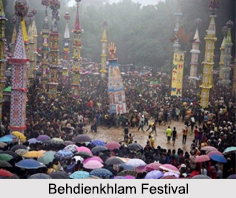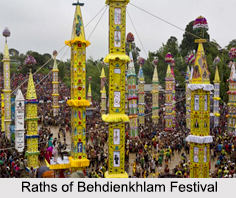 One of the most popular festivals of the Jaintia tribe, the Behdienkhlam festival is celebrated during the monsoon season in the month of July. It is a 4 days long festival that is mainly held in the small town of Jowai in the state of Meghalaya.
One of the most popular festivals of the Jaintia tribe, the Behdienkhlam festival is celebrated during the monsoon season in the month of July. It is a 4 days long festival that is mainly held in the small town of Jowai in the state of Meghalaya.
The purpose of the Behdienkhlam festival is to pray for the good health of people, property and invoking divine blessings for a bountiful harvest. The Behdienkhlam festival is observed by the non- Christian "Pnar" people who believe either in the traditional faith of "Niamtre" or Hinduism.
Etymology of Behdienkhlam Festival
The word "Behdien" means to drive away with sticks and "Khlam" means plague. Combining both the words, "Behdienkhlam" literally means to "drive away the evil and plague". The Behdienkhlam festival is also known as the festival for chasing away the Demon of Cholera.
Legends behind Behdienkhlam Festival
As per ancient lore, it is said that the Jowai town was once covered by thick forest, without any kind of human habitation. These dense forests were home to 5 deities, 4 stone structures, which can still be seen at the 4 corners of the town of Jowai, and lastly a river nymph. The 5 deities had wished for human settlement in the area and soon thereafter, a wandering Mongolian tribe had arrived in these forests.
 The deities were ecstatic and to express their joy at the arrival of humans, U-Mokhai, the eldest among the deities, began a great dance. Initially frightened by the thunderous dance of U-Mokhai, the settlers started to flee but were stopped by the deity himself and were assured that they were safe to inhabit the forest. Lastly, the deities advised the settlers to worship the divine elements in the form of the festival of Behdienkhlam.
The deities were ecstatic and to express their joy at the arrival of humans, U-Mokhai, the eldest among the deities, began a great dance. Initially frightened by the thunderous dance of U-Mokhai, the settlers started to flee but were stopped by the deity himself and were assured that they were safe to inhabit the forest. Lastly, the deities advised the settlers to worship the divine elements in the form of the festival of Behdienkhlam.
Rituals in Behdienkhlam Festival
A week prior to the Behdienkhlam festival, a pig is sacrificed to Knia Pyrthat or thunder to ward off evil. This is followed by the "Wasan" priest ringing the brass bell along the main road of the town to point to the entrance of the forest. One of the famous festivals of Meghalaya, the underlying idea and purpose of Behdienkhlam is to drive away all evils that plague human life.
The main feature of the Behdienkhlam festival is the making of the "Dein Khlam", "Symlend" and "Khnong", which are rounded, polished and tall trunks of trees, felled in the sacred forest and left there for a couple of days. After a couple of nights, the trunks are brought to the town with great fanfare, accompanied with dancing and singing. It is during this time that the festival reaches its peak as the "khnong" or the most sacred tree is brought to the centre of the town.
On the 4th and final day of the festivities, young men led by priests carry bamboo sticks and visit each home, where the roof is beaten to chase away evil spirits to the accompaniment of drums, cymbals and chanting in Pnar. The group is offered home-brewed rice beer by the lady of the house.
The youth of each locality also try out their artistic skills by erecting colourful "raths", which are about 30 to 40 ft in height and built out of bamboo, coloured paper and tinsel. During the afternoon of the final day of the festival, these "raths" are carried in procession towards a small lake at Aitnar for immersion.
After the arrival of the "raths", the polished, rounded logs are thrown into the river where they float and all men and boys rush towards them and try to balance on the rolling, shifting, slippery logs. The Behdienkhlam Festival reaches its conclusion with a football game known as "Dad-Lawakor", which is played with a wooden ball between the two tribal teams.
The festival ends with a final salutation to the divine powers when the women of the tribe offer sacrificial food to the Almighty.



















